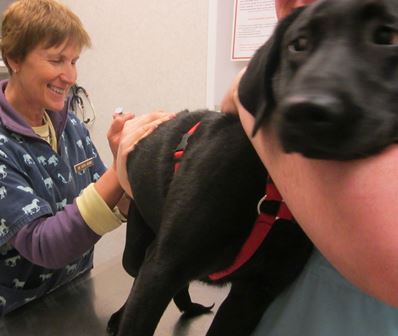
Rabies is a serious threat to the health of humans and animals and is deadly when left untreated. As the temperature rises, the numbers of rabies cases increase as well. Springtime is when wild baby animals are born and bats often return to the local area. In New York State, more than half of the rabies cases in wild animals are in raccoons, followed by bats, skunks and foxes. To prevent the spread of rabies, stay away from wild animals, even if they seem friendly. So far in 2018, one skunk and one raccoon in Putnam County have tested positive for rabies. Domesticated animals, such as cats and dogs, can also become sick with rabies. Regular pet vaccination can protect them.
“A person can become infected with the rabies virus through a bite from a sick animal,” says interim Commissioner of Health Michael J. Nesheiwat, M.D. from the Putnam County Department of Health (PCDOH). “Infection occurs when saliva from an infected animal comes in contact with an open wound or bite, or an individual’s eyes, nose or mouth. Remember, an animal does not have to look sick to be infected and the only way to tell if an animal has rabies is to test their brain tissue. That is why it is never a good idea to approach a wild or stray animal, no matter how cute.”
Every year, well-meaning residents try to help baby animals they think may have been abandoned. Instead, residents are urged to leave the animal alone, or call a wildlife rehabilitator to see if the animal truly needs assistance. Children should be taught to avoid all wild and stray animals and to tell an adult about any contact with an animal, including an unfamiliar pet.
“While wildlife and feral cats account for a portion of required rabies treatments, the number-one reason for treatments in Putnam County remains bats,” continues Dr. Nesheiwat. “If you find a bat in your home, it is important to capture it safely,” adds Dr. Nesheiwat. “We are able to test a captured bat for rabies and if it is not infected you can avoid the two-week series of shots.” To safely capture a bat, watch the popular demo from the New York State Department of Health (NYSDOH), available on the Putnam County website at http://www.putnamcountyny.com/how-to-capture-a-bat/ .
All animal bites or contact with wild animals should be reported promptly to the PCDOH at 845-808-1390. After hours or on weekends/holidays report the incident by calling the department’s environmental health hotline at 845-808-1390 and press “3.” A representative will promptly return your call. If a family pet encounters a wild animal, avoid immediate handling of your pet, or use rubber gloves and call the health department. Trained personnel will test a wild animal for possible rabies after an incident involving human or pet contact.
The mission of the Putnam County Department of Health, nationally accredited by the Public Health Accreditation Board (PHAB), is to improve and protect the health of the Putnam County community, composed of nearly 100,000 residents. Core services include community health assessment, disease surveillance and control, emergency preparedness, environmental health protection, family health promotion and health education. For more information, please visit our County website at www.putnamcountyny.com; or visit our social media sites on Facebook at www.facebook.com/putnamhealth and Twitter @PutnamHealthNY.